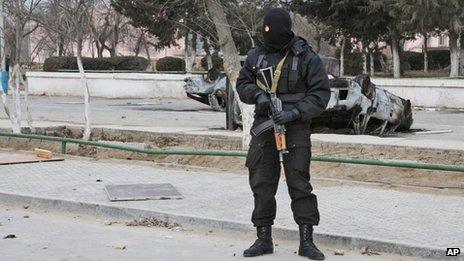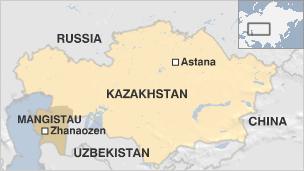Kazakhstan probes police use of weapons after deaths
- Published

Violence in the western Kazakh town of Zhanaozen earlier this month left 16 people dead
Prosecutors in Kazakhstan have opened a criminal inquiry into the use of weapons by police after 16 protesters were killed earlier this month.
The deaths occurred in clashes between police and oil protesting workers in Zhanaozen on 16 and 17 December.
A "criminal enquiry into the use of weapons by the security forces" had been opened, the prosecutor-general's office said on Thursday.
The violence was the worst since Kazakhstan's independence 20 years ago.
The investigation comes after video footage emerged on the internet appearing to show security forces beating and shooting people.
Eyewitnesses said police fired on unarmed oil workers, who had been protesting for months, in the town of 90,000.
But police say they were forced to defend themselves. A 20-day curfew is in effect until 5 January.

"General prosecutors opened a criminal enquiry into the use of weapons by the security forces which were aimed at hitting (their targets) and caused death," the prosecutors' spokesman Nurdaulet Suindikov said in a statement.
"An investigation group headed by a special prosecutor will carry out the investigation to ensure impartiality," the statement added.
The move marks the first time since the incident that Kazakh prosecutors have accused the police of firing on the protesters. Last week Kazakhstan asked the UN to help investigate the violence.
Separately, the privately-owned Interfax-Kazakhstan news agency reports that 18 people accused of taking part in the disturbances and looting have been arrested.
The governor of the Mangistau region, where the clashes occurred, has reportedly been sacked, along with the local boss of the state oil firm.
President Nursultan Nazarbayev has fired his son-in-law, Timur Kulibayev, from his position as head of Kazakhstan's sovereign wealth fund, which holds stakes in the companies whose workers were striking.
Correspondents say Mr Nazarbayev is keen to maintain his country's reputation as a bastion of stability in central Asia.
- Published22 December 2011
- Published17 December 2011
- Published26 October 2011